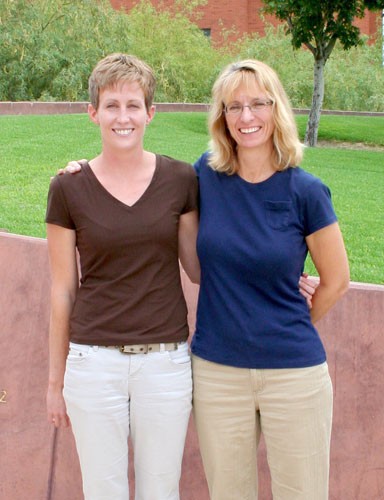The University of Arizona Disability Resource Center provides services to students in need. American Sign Language (ASL) interpreters Heather Donnel and Kathy Murtaugh are two staff members for the center who have been catering to the needs of the UA’s deaf students for years.
Donnel and Murtaugh have been interpreting at the UA for 11 and six years, respectively.
They sign for approximately 12 students and faculty, although according to Donnel, the number used to be much higher.
“”With the Americans with Disabilities Act, students can go to any college now and get interpretation services,”” said Donnel. “”It used to be that only certain schools offered the services.””
The Disability Resource Center has a total of five staff interpreters and several freelancers.
The interpreters sign for nearly anything, according to Murtaugh, but mostly classes and lectures.
Donnel and Murtaugh did not grow up using ASL, but rather learned the language later on in their lives.
“”I started learning sign to be able to communicate with a deaf girl I was teaching how to swim. Her whole family was deaf and her mom started teaching me sign,”” said Donnel. “”I actually didn’t take my first ASL class until my senior year of high school. My teacher told me I should become an interpreter so I applied to college for interpreting and that is what I’ve been doing ever since.””
Murtaugh began learning ASL off and on during the 1980s and ‘90s. She said her passion for English drew her to sign language.
“”I’ve always loved it,”” Murtaugh said. “”I love the challenge of trying to get at what people are really trying to say and sign language really requires this.””
Although knowing sign language is a valuable skill, Donnel and Murtaugh wanted to take on the responsibilities of making it their career.
“”I decided to sign for a living because everyone always says to find something you love as your career,”” said Murtaugh. “”I didn’t know what it entailed but once I started the classes, I was hooked.””
Interpreters also get the opportunity to never stop learning with their job.
“”I love my job for the variety of classes we get to interpret at a university level,”” Donnel said. “”I like that I get to learn something new every day without having to take the exams. This is a great job for someone who is a life-long learner.””
Like any job, there are certain challenges that interpreters face.
“”We pretty much have to carry anything we might need from the office around with us, such as lunch, water, all our books and folders because there usually isn’t time to go back for anything,”” said Murtaugh. “”We choose our clients and schedules based on time and proximity. We also do not follow one client per day; we switch from person to person.””
Donnel and Murtaugh have also interpreted for language classes, which they say is much more difficult to sign for than a class taught in English.
“”I’ve signed for a Spanish class at Pima Community College before,”” said Murtaugh. “”Once we even had to do an Arabic class. That was hard, but we were mostly only interpreting what the teacher said in English.””
In addition to providing interpreters like Donnel and Murtaugh, the Disability Resource Center also offers services such as Communication Access Realtime Translation (CART) machines and designated note takers.









